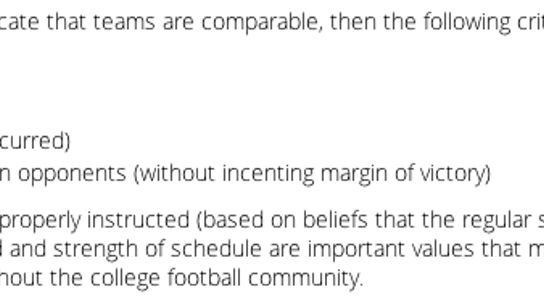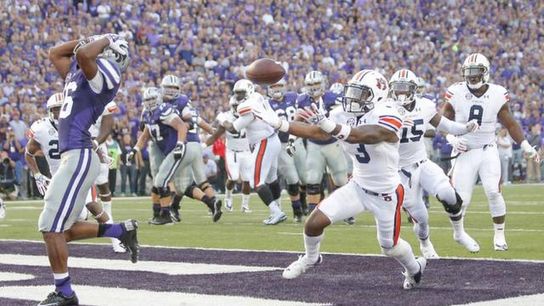The College Football Playoff selection committee released its second Top 25 on Tuesday night. While we still maintain that any pre-Selection Sunday rankings are completely meaningless and a disservice to the process to even be released, it has proven an interesting window into how the committee thinks.
Knowing that six Top 25 vs. Top 25 games wait Saturday will completely re-shape next week's rankings and in the process burst the premise of this column into flames, there are three scenarios looming that could reveal the committee's thinking and, thus, sending the rest of college football scrambling to be on the right side of the debate.
1) What's more important, head-to-head or conference championships? Auburn ranks No. 3, a "strong No. 3" in the words of committee chairman Jeff Long, at 7-1, partly on the strength of a 20-14 win at Kansas State on a Thursday night in September. Kansas State, also 7-1, is seventh. Let's assume both teams win out, but Mississippi State also wins out so the Tigers do not win the SEC West.
At that point, Auburn's resume would include wins over:
- at Top 10 Kansas State
- at Top 10 Ole Miss
- at Top 10 Alabama (this would be after suffering a hypothetical loss to Mississippi State)
- at Top 20 Georgia
- vs. Top 15 LSU
- decisive loss to No. 1 Mississippi State on the road
And Kansas State:
- at Top 10 TCU
- at Top 10 Baylor
- at Top 15 Oklahoma
- at Top 20 West Virginia
- close loss to Top 3 Auburn
Clearly, the head-to-head match-up is the difference here. But seemingly every committee member made a point this spring and summer to emphasize the importance of conference championships. (And, should Kansas State pull it off, the Wildcats would have accomplished a truly rare conference title run. I don't have the numbers in front of me, but I'd suspect the number of teams that have gone 9-0 in conference play while beating all four of their top competitors inside the opponent's stadium can be counted on one hand. Safe to say, should it happen, Kansas State will let us know the exact number come early December.)
For what it's worth, conference championships are the first item listed in the committee's (incredibly vague) selection criteria:

It's important to note that the committee is not taking into account conference championships until they've actually been won. Will that bonus be enough to trump head-to-head and potentially move Auburn out of the Playoff?
2) Is it really worth it to schedule major non-conference games? Michigan State is proving to be an interesting test case. The Spartans hopped a plane to Eugene on September 6, and lost 46-27 in a game that was closer than the final score. And now those one-loss Spartans are ranked eighth, buried behind one-loss competitors Auburn, Oregon, Alabama, TCU and Kansas State. To this point the committee has indicated, like the poll system before them, the most important bullet point in a team's resume is a zero in the loss column. So, where would the Spartans be if they'd stayed home and pasted a Horizon League team 55-0? And while we're at it, should Kansas State have cancelled the Auburn game and lined up a Sun Belt foe instead?
Again, it's impossible to know where an 8-0 Michigan State team would rank (the committee doesn't seem very impressed with the Big Ten), but it's a reasonable assumption to say they'd be higher than eighth. The Playoff thus far has proven to be an effective tool of promoting the moral good (and I'm using the term moral very loosely here) of incentivizing major programs to schedule each other in non-conference. Texas and LSU, Texas A&M and Clemson and Auburn and California have announced future home-and-homes in the past three weeks.
Will athletics directors start to think twice about ambitious scheduling if Kansas State and Michigan State are ranked fifth and sixth on Selection Sunday?
3) How much does the eye test matter? The biggest discussion point in this week's rankings was Alabama at fifth, and TCU at sixth. Most observers agree the Horned Frogs have the stronger resume at this point. The teams share a common opponent in West Virginia, but TCU beat the Mountaineers in Morgantown while Alabama won a virtual home game in Atlanta. That West Virginia win also represents Alabama's only Top 25 win at this point, while TCU beat No. 15 Oklahoma.
So what pushed the Tide over the top?
This, in my opinion, is a minefield the committee would best avoid. How do you possibly quantify the way Alabama handled Tennessee's red zone offense against the way TCU picked up Oklahoma State's zone blitz? There are a litany of opponent-adjusted stats, but the committee has stated they aren't interested in viewing them. And as strange as it sounds, what happened on the field previously can be a terrible indicator of what will happen on the field in the future. The eye test says Ohio State is a much better team than Virginia Tech, yet the Hokies were better on September 6. The same can be said for Oregon and Arizona, but it was the Wildcats who won on October 2. Predictions and projections are wrong every week in college football, but seasons and careers will be made and broken on them.
It is truly impossible to project the answers to these questions, and anyone that claims to have the answer is lying. You can't predict something that's never happened before.
But the results will create precedent that will in turn shape college football's future.
